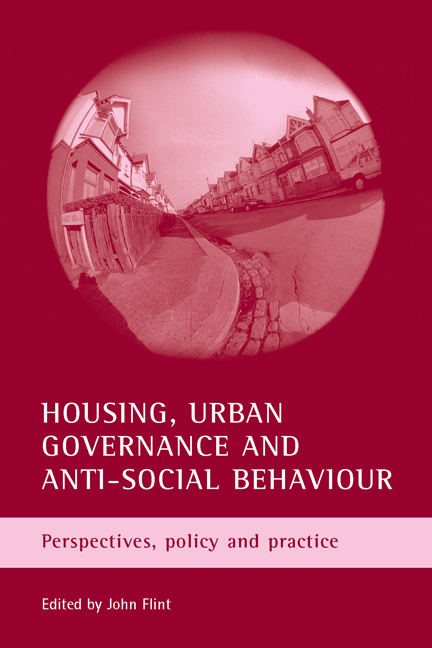Book contents
- Frontmatter
- Contents
- List of tables, figures and photographs
- Acknowledgements
- Notes on contributors
- Introduction
- Part 1 The definition and construction of anti-social behaviour in the UK
- Part 2 Legal techniques and measures utilised by social landlords to address anti-social behaviour
- Part 3 The emerging mechanisms of addressing anti-social behaviour in housing governance
- Part 4 Studies of housing and anti-social behaviour from an international perspective
- Index
two - Governing tenants: from dreadful enclosures to dangerous places
Published online by Cambridge University Press: 15 January 2022
- Frontmatter
- Contents
- List of tables, figures and photographs
- Acknowledgements
- Notes on contributors
- Introduction
- Part 1 The definition and construction of anti-social behaviour in the UK
- Part 2 Legal techniques and measures utilised by social landlords to address anti-social behaviour
- Part 3 The emerging mechanisms of addressing anti-social behaviour in housing governance
- Part 4 Studies of housing and anti-social behaviour from an international perspective
- Index
Summary
Introduction
As several other chapters in this volume identify (see Chapters One, Three and Seven), the response of social landlords to anti-social behaviour (ASB) by their tenants became more legalistic and authoritarian during the 1990s. However, there is a long history of housing management as a control technique, beginning with Octavia Hill in the late 19th century and continuing through the growth of council housing in the 20th century. The way in which ‘difficult’ or ‘problematic’ tenants have been defined has changed over time, as have the techniques or approaches adopted to deal with their behaviour.
This chapter explores the different roles assigned to council housing since its introduction in the early 20th century, identifying the impact of changing ‘political rationalities’. It then considers the dominant ‘translation’ discourses that have objectified council estates and individual council tenants making them the subject of differentiated treatment by governmental agencies. The problematic of ASB is used to explore the changing discourses around the control of tenant behaviour and the changing scope and nature of housing management practices that are applied to ‘problematic tenants’.
Changing political rationalities
Rose and Miller (1992) argue that during the 20th century we have seen the emergence of two dominant political rationalities in Western nation states. By ‘political rationality’ Rose and Miller mean:
… the changing discursive fields within which the exercise of power is conceptualised, the moral justifications for particular ways of exercising power by diverse authorities, notions of the appropriate forms, objects and limits of politics, and conceptions of the proper distribution of such tasks among secular, spiritual, military and familial sectors. (Rose and Miller, 1992, p 175)
The first rationality or discourse informed the development of ‘welfare’ states during the late 19th and early 20th century. An array of technologies, programmes and projects arose from shared principles and values, for example, social insurance, healthcare provision, education system, public housing and so on. All such ‘governmental’ policies and programmes, it is argued, were devised from a ‘social’ point of view. A greater understanding of the collective experiences of certain societies gave rise to demands that the nation should be governed in the interests of social protection, social justice, social rights and social solidarity (Rose, 1996, p 329).
- Type
- Chapter
- Information
- Housing, Urban Governance and Anti-Social BehaviourPerspectives, Policy and Practice, pp. 37 - 56Publisher: Bristol University PressPrint publication year: 2006
- 1
- Cited by



